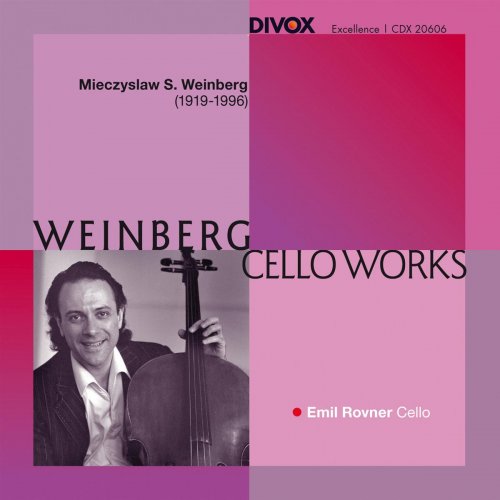
Emil Rovner - Weinberg: Cello Works (2017)
BAND/ARTIST: Emil Rovner
- Title: Weinberg: Cello Works
- Year Of Release: 2017
- Label: Divox
- Genre: Classical
- Quality: flac lossless (tracks) +Booklet
- Total Time: 01:04:11
- Total Size: 229 mb
- WebSite: Album Preview
Tracklist
01. Sonata No. 2 for Solo Cello, Op. 121: I. Andante (1977 Version)
02. Sonata No. 2 for Solo Cello, Op. 121: II. Allegro (1977 Version)
03. Sonata No. 2 for Solo Cello, Op. 121: III. Adagio (1977 Version)
04. Sonata No. 2 for Solo Cello, Op. 121: IV. Allegretto (1977 Version)
05. 24 Preludes, Op. 100: Prelude No. 4
06. 24 Preludes, Op. 100: Prelude No. 3
07. 24 Preludes, Op. 100: Prelude No. 10
08. 24 Preludes, Op. 100: Prelude No. 11
09. 24 Preludes, Op. 100: Prelude No. 12
10. 24 Preludes, Op. 100: Prelude No. 14
11. 24 Preludes, Op. 100: Prelude No. 8
12. 24 Preludes, Op. 100: Prelude No. 7
13. 24 Preludes, Op. 100: Prelude No. 17
14. 24 Preludes, Op. 100: Prelude No. 19
15. 24 Preludes, Op. 100: Prelude No. 20
16. 24 Preludes, Op. 100: Prelude No. 21
17. 24 Preludes, Op. 100: Prelude No. 22
18. 24 Preludes, Op. 100: Prelude No. 23
19. 24 Preludes, Op. 100: Prelude No. 24: Menuet
20. From the Lyrics of Zhukovsky, Op. 116: Die Nacht (the Night)
Because Mieczyslaw Weinberg is almost always mentioned in connection with his more famous friend and colleague, Dmitry Shostakovich, his place in Soviet-era music has been somewhat obscured and his compositions relatively overlooked. However, efforts to record Weinberg's prodigious output have made it more accessible to interested western listeners, and many find the best of his music every bit as serious, compelling, and satisfying as Shostakovich's work. The solo cello pieces Emil Rovner recorded for Divox provide an opening for newcomers to explore Weinberg's modes of expression, because the concentrated linear style of the Sonata No. 2 and the selected preludes is clear and easy to follow. While Weinberg's tonality is complicated by many unexpected shifts of key areas, the overall impression is that it is largely diatonic, often suggestive of minor keys, and the frequent use of consonant intervals in double-stops mitigates any sense of harshness. Long-breathed melodies and the idiomatic use of advanced cello techniques make these attractive compositions, which many cellists should add to their repertoire. Weinberg's song writing is also shown in the world-premiere recording of "Die Nacht," in which Rovner sings and accompanies himself at the piano. This haunting song is an unexpected offering on a cello album, but Rovner reveals himself to be as polished a singer as he is a skilled instrumentalist, and this track serves to emphasize the lyrical impulse that runs through much of the cello music.
01. Sonata No. 2 for Solo Cello, Op. 121: I. Andante (1977 Version)
02. Sonata No. 2 for Solo Cello, Op. 121: II. Allegro (1977 Version)
03. Sonata No. 2 for Solo Cello, Op. 121: III. Adagio (1977 Version)
04. Sonata No. 2 for Solo Cello, Op. 121: IV. Allegretto (1977 Version)
05. 24 Preludes, Op. 100: Prelude No. 4
06. 24 Preludes, Op. 100: Prelude No. 3
07. 24 Preludes, Op. 100: Prelude No. 10
08. 24 Preludes, Op. 100: Prelude No. 11
09. 24 Preludes, Op. 100: Prelude No. 12
10. 24 Preludes, Op. 100: Prelude No. 14
11. 24 Preludes, Op. 100: Prelude No. 8
12. 24 Preludes, Op. 100: Prelude No. 7
13. 24 Preludes, Op. 100: Prelude No. 17
14. 24 Preludes, Op. 100: Prelude No. 19
15. 24 Preludes, Op. 100: Prelude No. 20
16. 24 Preludes, Op. 100: Prelude No. 21
17. 24 Preludes, Op. 100: Prelude No. 22
18. 24 Preludes, Op. 100: Prelude No. 23
19. 24 Preludes, Op. 100: Prelude No. 24: Menuet
20. From the Lyrics of Zhukovsky, Op. 116: Die Nacht (the Night)
Because Mieczyslaw Weinberg is almost always mentioned in connection with his more famous friend and colleague, Dmitry Shostakovich, his place in Soviet-era music has been somewhat obscured and his compositions relatively overlooked. However, efforts to record Weinberg's prodigious output have made it more accessible to interested western listeners, and many find the best of his music every bit as serious, compelling, and satisfying as Shostakovich's work. The solo cello pieces Emil Rovner recorded for Divox provide an opening for newcomers to explore Weinberg's modes of expression, because the concentrated linear style of the Sonata No. 2 and the selected preludes is clear and easy to follow. While Weinberg's tonality is complicated by many unexpected shifts of key areas, the overall impression is that it is largely diatonic, often suggestive of minor keys, and the frequent use of consonant intervals in double-stops mitigates any sense of harshness. Long-breathed melodies and the idiomatic use of advanced cello techniques make these attractive compositions, which many cellists should add to their repertoire. Weinberg's song writing is also shown in the world-premiere recording of "Die Nacht," in which Rovner sings and accompanies himself at the piano. This haunting song is an unexpected offering on a cello album, but Rovner reveals himself to be as polished a singer as he is a skilled instrumentalist, and this track serves to emphasize the lyrical impulse that runs through much of the cello music.
Year 2017 | Classical | FLAC / APE
As a ISRA.CLOUD's PREMIUM member you will have the following benefits:
- Unlimited high speed downloads
- Download directly without waiting time
- Unlimited parallel downloads
- Support for download accelerators
- No advertising
- Resume broken downloads


